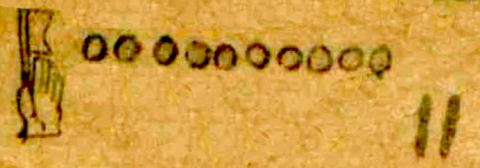60 matl (T1871:1)
This notation for the measurement of 60 arm lengths (60 (matl) of land), includes a red flag (pantli), standing for 20, 10 small circles (representing ten ones), and two hash marks. The flag appears above the hand (matl), which is a left hand. The circles run along in a horizontal row. While it appears that some of the dots may have colors, this may be inadvertent, and they may have been intended to be neutral, the same color as the paper.
Stephanie Wood
The full measurement results in something of a mathematical equation, (20 + 10) x 2 (the hash marks) = 60. The distinction between matl and maitl is something we are watching. It may be that matl is used more for measurements. Similarly, we are watching for the use of pantli, tecpantli, panitl, and pamitl. It is a challenge to differentiate between them, for they look very much alike most of the time. For now, when the banner has an association with a number, we are using pantli or tecpantli, watching how they are glossed, and when it is a phonetic locative for a place name, we are often using panitl. Apparently panitl was more common in "Mexico, the Tepanec heartland, and perhaps Colhuacan and Chalco," and pamitl in "northern and eastern flanks of the Valley of Mexico" [see: Jorge Klor de Alva, in The Work of Bernardino de Sahagún: Pioneer Ethnographer of Sixteenth-century Aztec Mexico (Albany, NY: Institute for Mesoamerican Studies, the University at Albany, State University of New York, 1988), 323]. As glyphs come in to this collection from regions where pamitl is more common, we will abide by that orthography.
Stephanie Wood
1558
números, banderas, manos

ma(tl), hand or arm, a measurement, https://nahuatl.wired-humanities.org/content/matl
ma(itl), hand/arm, https://nahuatl.wired-humanities.org/content/maitl
pan(tli), ridge, furrow, an agricultural row, https://nahuatl.wired-humanities.org/content/pantli
pam(itl), flag or banner, https://nahuatl.wired-humanities.org/content/pamitl
sesenta manos o brazas
Single-page codex, Archivo General de la Nación, México, Ramo de Tierras, vol. 1871, exp. 1, fol. 28r.
The Archivo General de la Nación (AGN), México, holds the original manuscript. This image is published here under a Creative Commons license, asking that you cite the AGN and this Visual Lexicon of Aztec Hieroglyphs.


